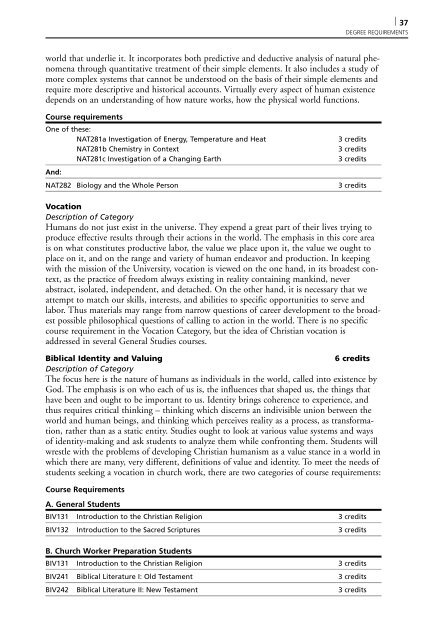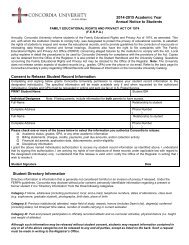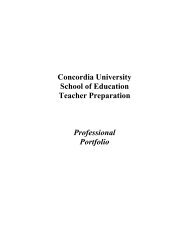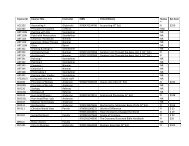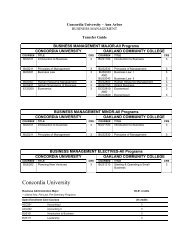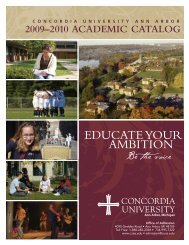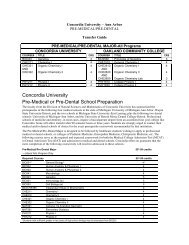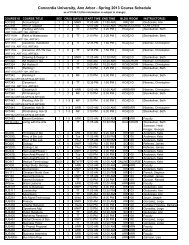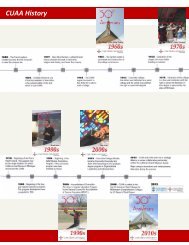2006â2007 Academic Catalog - Concordia University Ann Arbor
2006â2007 Academic Catalog - Concordia University Ann Arbor
2006â2007 Academic Catalog - Concordia University Ann Arbor
Create successful ePaper yourself
Turn your PDF publications into a flip-book with our unique Google optimized e-Paper software.
| 37<br />
DEGREE REQUIREMENTS<br />
world that underlie it. It incorporates both predictive and deductive analysis of natural phenomena<br />
through quantitative treatment of their simple elements. It also includes a study of<br />
more complex systems that cannot be understood on the basis of their simple elements and<br />
require more descriptive and historical accounts. Virtually every aspect of human existence<br />
depends on an understanding of how nature works, how the physical world functions.<br />
Course requirements<br />
One of these:<br />
NAT281a Investigation of Energy, Temperature and Heat<br />
NAT281b Chemistry in Context<br />
NAT281c Investigation of a Changing Earth<br />
And:<br />
NAT282 Biology and the Whole Person<br />
3 credits<br />
3 credits<br />
3 credits<br />
3 credits<br />
Vocation<br />
Description of Category<br />
Humans do not just exist in the universe. They expend a great part of their lives trying to<br />
produce effective results through their actions in the world. The emphasis in this core area<br />
is on what constitutes productive labor, the value we place upon it, the value we ought to<br />
place on it, and on the range and variety of human endeavor and production. In keeping<br />
with the mission of the <strong>University</strong>, vocation is viewed on the one hand, in its broadest context,<br />
as the practice of freedom always existing in reality containing mankind, never<br />
abstract, isolated, independent, and detached. On the other hand, it is necessary that we<br />
attempt to match our skills, interests, and abilities to specific opportunities to serve and<br />
labor. Thus materials may range from narrow questions of career development to the broadest<br />
possible philosophical questions of calling to action in the world. There is no specific<br />
course requirement in the Vocation Category, but the idea of Christian vocation is<br />
addressed in several General Studies courses.<br />
Biblical Identity and Valuing<br />
6 credits<br />
Description of Category<br />
The focus here is the nature of humans as individuals in the world, called into existence by<br />
God. The emphasis is on who each of us is, the influences that shaped us, the things that<br />
have been and ought to be important to us. Identity brings coherence to experience, and<br />
thus requires critical thinking – thinking which discerns an indivisible union between the<br />
world and human beings, and thinking which perceives reality as a process, as transformation,<br />
rather than as a static entity. Studies ought to look at various value systems and ways<br />
of identity-making and ask students to analyze them while confronting them. Students will<br />
wrestle with the problems of developing Christian humanism as a value stance in a world in<br />
which there are many, very different, definitions of value and identity. To meet the needs of<br />
students seeking a vocation in church work, there are two categories of course requirements:<br />
Course Requirements<br />
A. General Students<br />
BIV131 Introduction to the Christian Religion 3 credits<br />
BIV132 Introduction to the Sacred Scriptures 3 credits<br />
B. Church Worker Preparation Students<br />
BIV131 Introduction to the Christian Religion 3 credits<br />
BIV241 Biblical Literature I: Old Testament 3 credits<br />
BIV242 Biblical Literature II: New Testament 3 credits


